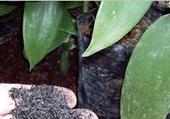Planting seeds of success
UNSW is accelerating research into biochar, an organic product derived from biological waste that harnesses carbon emissions, boosts crop yields and improves sustainable land use.
UNSW is accelerating research into biochar, an organic product derived from biological waste that harnesses carbon emissions, boosts crop yields and improves sustainable land use.

UNSW is accelerating research into biochar, an organic product derived from biological waste that harnesses carbon emissions, boosts crop yields and improves sustainable land use for horticulture and forestry.
The potential for biochar to contribute to a low-carbon energy future has been in the media spotlight recently.
Technology converts agricultural bio-waste such as green waste, chicken manure, rice husks, corn cobs and peanut shells into biochar by thermal decomposition in an oxygen-starved environment at low temperatures.
It produces gas that can be used as fuel and the leftover biochar that can be buried in the soil to "lock up" carbon for decades or centuries, while boosting soil productivity.
UNSW has a three-year ARC Linkage Grant with Biomass Energy Services Technology Pty Ltd to advance scientific understanding of biochar. Also, Visiting Professor Stephen Joseph has attracted venture capital funding for UNSW biochar research and he is currently in the US seeking more investment support.
"There is no question that biochar can boost agricultural output by speeding the growth rate of plants," says Professor Paul Munroe, who is co-chief investigator of the ARC Linkage research.
"Our research focus is to characterise different biomass feed stocks and determine their potential to improve soils and boost the growth of different crops and plants."
For more on this story visit Faculty of Science News.
Media contacts: Dan Gaffney | d.gaffney@unsw.edu.au | 0411 156 015